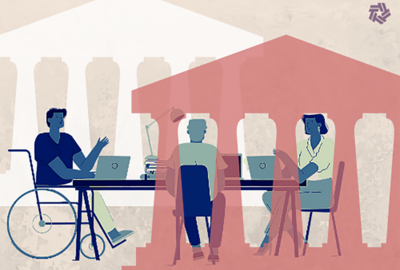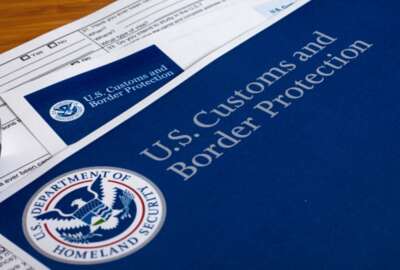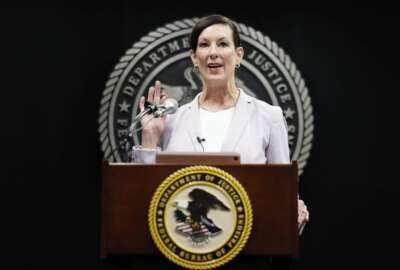This group is called FEW, but luckily there’s more than a few of them
Federally Employed Women (FEW) has a new president, and she's got ideas.
Federally Employed Women (FEW) has a new president, and she’s got ideas. To delve into those ideas, Federal Drive with Tom Temin spoke with FEW President Pamela Richards, who also happens to be a Supervisory Investigative Research Analyst at the Government Accountability Office.
Interview Transcript:
Tom Temin And we know you’re speaking from the FEW standpoint, not GAO, but in case people were curious about what you did in your daytime job. But you’ve been FEW president for a year now, so I’m sorry it took so long to get to you. What are the top issues you’re thinking about these days in the FEW standpoint?
Pamela Richards Well, some of the challenges that we’re looking at, one is what the future of work looks like, how to make a better government workforce. When it comes to creating a better government workforce, FEW is a part of the solution and providing a four pillar approach to help these members advance their careers in training, diversity, compliance and legislative efforts. And we’ll begin to look at the future of work. No one planned for a pandemic. We didn’t know that a pandemic was coming. And so we’re talking about the remote challenges that come with working in a remote environment for the last three years and now having to go back into the office, which is considered the future of work. Looking at how this is going to affect our membership as it relates to some of the members became teachers, counselors, school bus drivers, caregivers and things like that for their family members. And how do they now incorporate this back into their work life of having to go back into office with the commute, so many things that once was pre-pandemic.
Tom Temin Yes, and it’s not that clear cut a picture like five days a week and you’re in the office ten days out of your pay period. But some agencies want four or five days out of the pay period. So that’s half the time going in, half the time staying at home. And I imagine especially for women employees, because right or wrong, they tend to get the burden of worrying about the domestic issues. And so that’s really complicated, isn’t it, because you don’t have regularity anymore.
Pamela Richards Right? Absolutely. Generally, as you stated, the women are the glue to the family as well as trying to have a career and taking care of the challenges that may come up with their children, with their loved ones that they’re now taking care of. And in this DMV area that commute back and forth, getting back into that routine of things pre-pandemic, those three years of being out, it’s kind of tough to get back into, like you say.
Tom Temin Yes. And everyone’s wondering if nobody is in the office yet, why are the roads so jammed again? And that seems to be the cosmic mystery these days.
Pamela Richards I said the same thing Sunday travelling. I said, Where does everybody go? And when we’re at home, there shouldn’t be any traffic. Nobody should be going north or south like this. And you’re totally right.
Tom Temin All right. And just give us a little sense. Back up here for a moment. How many people are in FEW? How far back does the organization go? And tell us about how you connect with one another?
Pamela Richards Well, I am happy to say that FEW is 55 years old as of May. We started in 1968 with 13 members. Our very first president, Allie Latimer, is still living, still with us, still providing knowledge and wisdom over the years of about this grassroots organization. We are celebrating our 54th national training program coming up in July, which I’ll cover at a later time. But we are still here looking at the challenges that are facing our members, as well as providing training opportunities, both in-person, some virtual, some social, some service oriented, all activities that be of character and transferable skills. We have a number of webinars that we have been putting on as relates to leadership and personal development. We are now moving back into the in-person national training program after three years of the Virtual Leadership Summit. And then some of the chapters and regions are now having social meet up and they are continuing with community service.
Tom Temin We’re speaking with Pamela Richards. She’s president of the Federally Employed Women’s group. A year now into that presidency. And tell us more about the 54th training event in July. This is back in person and where is it and is it maybe hybrid also for those that don’t want to travel?
Pamela Richards Well, it is not hybrid. I must say we wanted to get a feel of how things would be in an in-person environment. We will be meeting in downtown Hilton Columbus Hotel is the host hotel, and we have a second hotel that is the Hyatt Regency. That’s just a small walk away from the Hilton. And we’ll be there July 9th through the 13th. We have over 110 classes slated for this week. It is our legislative theme this year where we are leveling up for success and envisioning a new level. And we will be there with our award ceremony that we recognize all of our members for their hard work as those as well as our military who are pushing DEIA efforts as well. And then we will have a mentoring graduation, which is another component of Federally Employed Women, where we mentor, we have a cohort number two. We will successfully graduate Cohort two and looking forward to welcoming cohort number three. So we’re excited about this in-person event. And as we use this as a benchmark of what we can do in-person, I am actually looking at providing a hybrid event because of the demand and the questions about a hybrid event. I will be looking to plan one for 2024.
Tom Temin Yeah, it’s no trivial affair having things in-person and online when it comes to setting up all the technology and everything. How many people do you expect to attend?
Pamela Richards We are currently sitting right below 600 that will be attending. Our footprint covers ten regions all across the United States as well as we do have about 2800 members in our organization at this time.
Tom Temin All right. And tell us more about the membership. Does it range from, say, non managerial line employees up to the higher levels? And does it also include members, I think you’ve mentioned this of the military or military employed women.
Pamela Richards Yes, sir. So anyone can be a member of Federally Employed Women as long as you support the mission and vision of this organization. And we have a large range of from top level senior executive services who also serve as executive champions within our chapters, as well as all the way down to GS-6 or 7. We have private sector personnel who are members of this organization, military as well as contractors. And we do also have men. We don’t leave our men out. We are a diverse and inclusive environment. Everyone has a place here at Federally Employed Women.
Tom Temin All right. And what do the women tell you nowadays? What are especially people entering the federal workforce? Do you get the sense that maybe the opportunities, how do they compare, would you say, with the private sector in terms of acceptance as a woman and the ability to reach whatever your goals and talents permit you to reach without any kind of discriminatory impediment in the way. Better in government or industry?
Pamela Richards So some of the things that women have shared, as far as our membership has shared, with us is the challenge that is still there, that making the same amount of money as our male counterparts, breaking that glass ceiling, having a seat at the table. And one of the things that I ran on in my campaign is not only do I want to equip the women to have a seat at the table, but I also want them to own the tables that they sit at. And so through that is providing the premiere training that we provide and the webinars that we provide throughout the year and making sure that this training is impactful and intentional that will help them and have transferable skills that will allow them to apply that to their personal and professional lives. The standard as well as coming back looking at reasonable accommodations after the pandemic, toxic workplace behaviors and just women working together, being able to navigate that. And how to get promoted, how to excel now in a semi-hybrid and once virtual environment. So that is one of the major challenges, is how do I excel when I don’t have that see, touch and feel with my colleagues as well as my boss, who I see every day. How do they know what I’m doing?
Tom Temin Sure. And I imagine you get some good support, moral support anyway from your agency, because these types of activities take time and they must understand that this is important and it benefits them also, right?
Pamela Richards Absolutely. Our agencies are huge supporters. They’re our allies. And we also partnered with our federal women’s program managers who are inside the agency where their agencies are required to have. And so we partnered with them to find out the issues that are some agency specific and some are not, and those that are agency specific, we try to assist them and provide resources for them. And then those things that affect women globally, we try to ensure that we are providing those resources to them as well. But our agencies are huge supporters. I can’t thank them enough for supporting us throughout the year, especially during our national training program by sending their members and entrusting us to bring about that for me, a training experience for them.
Copyright © 2025 Federal News Network. All rights reserved. This website is not intended for users located within the European Economic Area.
Tom Temin is host of the Federal Drive and has been providing insight on federal technology and management issues for more than 30 years.
Follow @tteminWFED






